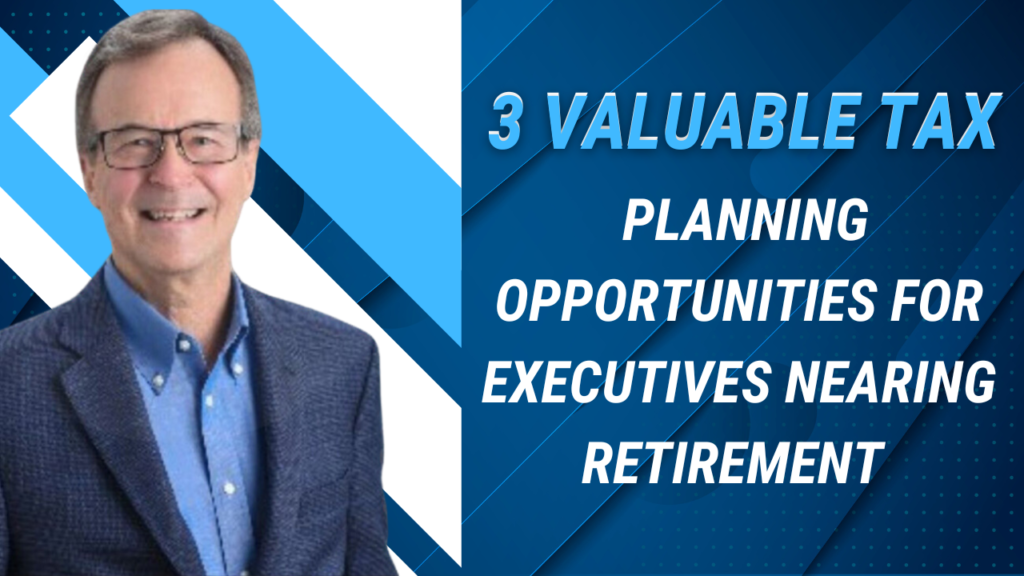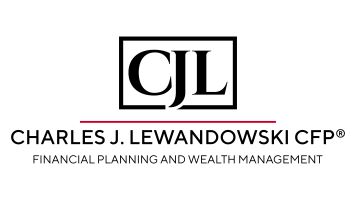Three Valuable Tax Planning Opportunities For Executives Nearing Retirement

Retiring? – Have You Thought About Taxes?
If you’re a well-compensated executive or business owner thinking of retiring in the next 3 to 5 years, there are several commonly missed tax planning opportunities that you should consider now to possibly enhance your retirement income and savings.
I’m Chuck Lewandowski, CERTIFIED FINANCIAL PLANNER™ professional and I work with executives and small business owners who want to plan for their best retirement.
During the past 2-3 months, I’ve worked with successful working couple and a Vice President of a large insurance company. In both cases, these clients wanted a plan to help them retire before age 65 so they can spend quality time with their families. They wanted to be confident that they could maintain their current lifestyle and achieve their retirement goals for a very long time
Although they worked in different industries and different states, they had one common blind spot. They didn’t have a clear understanding of several planning techniques that could help them achieve their goals in a tax efficient manner. Together, we found three areas that could contribute to their retirement well-being.
Health Savings Account – Triple Tax Free!
#1 Health Savings Account or HSA – This is a commonly misunderstood employee benefit that’s often confused with the similarly sounding Flex Spending Account. If you have a high deductible health insurance plan through your employer or the Affordable Care Act Marketplace, you may be eligible to contribute to this valuable account. The big benefit is that contributions are triple tax free if they are used for health care expenses. They reduce taxable income when you make the contribution. The dollars may be invested and not taxed while they are in the account. And they aren’t taxed upon withdrawal when used for qualified health care bills. Unlike the FSA, funds that aren’t used in the current year can be carried into future years. You can use this account to create another source of tax favored funds in retirement besides your IRA or 401k.
Don’t Rollover That Company Stock!
#2 Net Unrealized Appreciation or NUA – If you hold your employer’s stock in your 401k, do not automatically roll your 401k into an IRA when you separate from the company. NUA is the difference between the average cost basis of the shares that you purchased and the current market value of the shares. There is a provision in the tax code, if correctly applied, that allows for favorable capital gains tax treatment of the appreciation versus the normal ordinary income tax treatment that you incur when you withdraw from an IRA. The process is somewhat complex but, when implemented correctly in conjunction with your tax advisor, it can provide significant value.
A Tax Tool For The Charitably Inclined
#3 Donor Advised Fund– Most taxpayers are not aware that, although they give to charity on a regular basis, they aren’t receiving a tax deduction for those contributions because they haven’t exceeded the annual standard deduction. By “bunching” several years’ donations into a single year and contributing to a Door Advised Fund, you may be able to exceed the standard deduction and get a tax benefit for your contribution. Once you give the Donor Advised Fund a contribution, you can direct them to distribute grants to eligible 501(c)3 charities over time. Many major brokerages offer these funds. The contributions are irrevocable, so some planning is involved.
All three of these techniques can provide significant tax benefits. However, it’s important to review your goals with a qualified tax advisor to ensure that you implement them properly.
If you want to evaluate opportunities such as these as part of your financial plan, please give me a call and Let’s Make a Plan.
Advisory Services offered through Lincoln Investment or Capital Analysts, Registered Investment Advisers. Securities offered through Lincoln Investment, Broker Dealer, Member FINRA/SIPC. www.lincolninvestment.com West Coast Financial Group, Inc. and the above firms are independent, and non-affiliated. Tax services are not offered through, nor supervised by, The Lincoln Investment Companies. The hypothetical example used was for illustrative purposes only, and is not meant to represent the any specific individual. None of the information in this video should be considered as tax advice. You should consult your tax professional for information concerning your individual situation.
